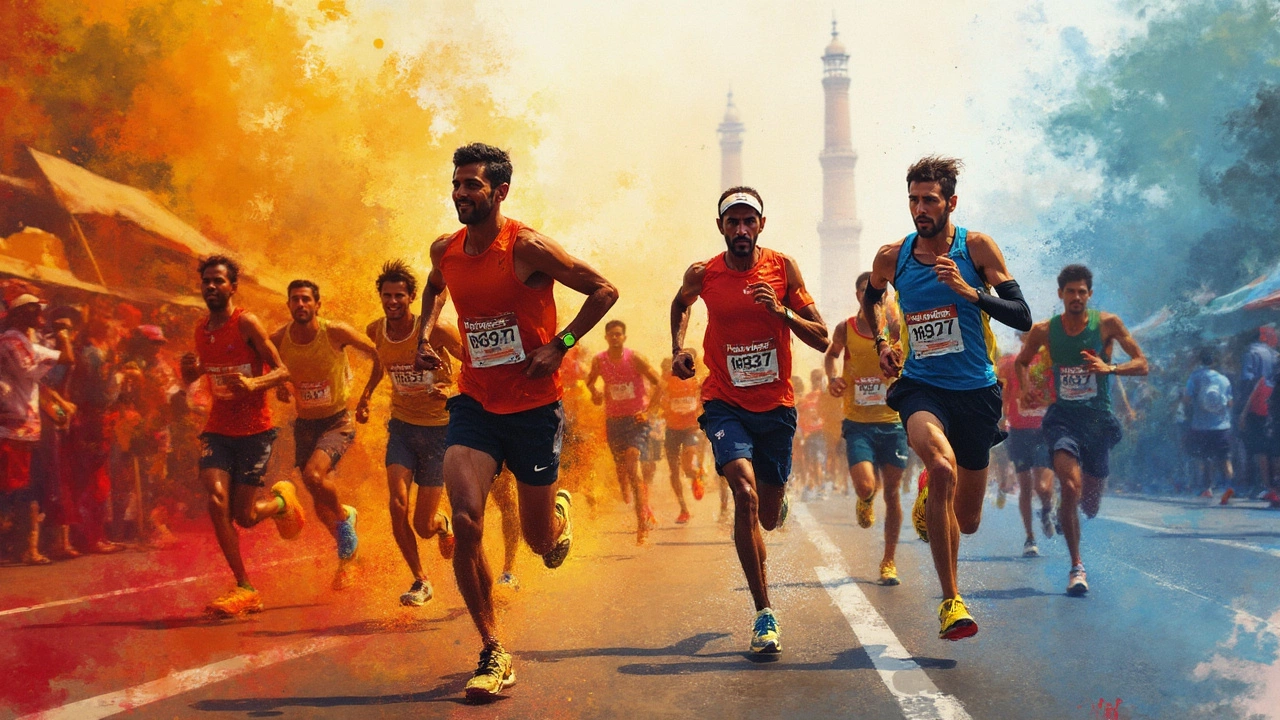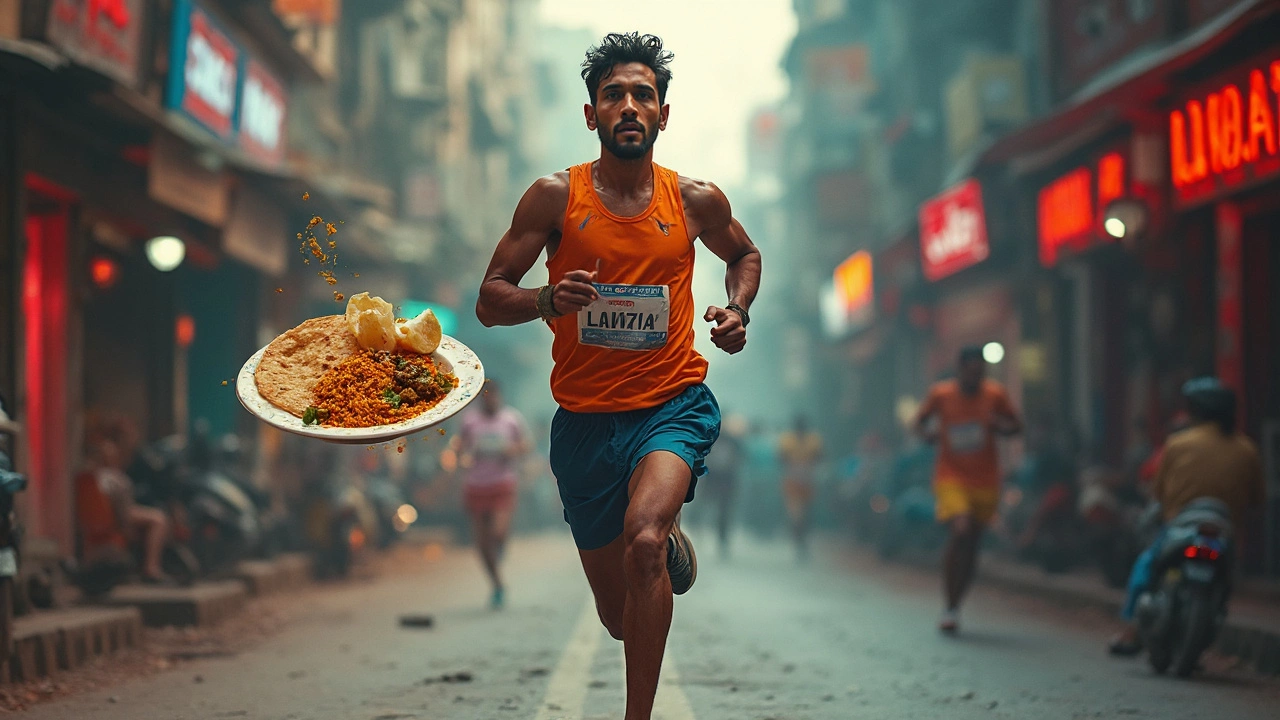Ever wondered if marathon runners have to eat a ton of food? Well, their appetites might surprise you. Training for a marathon is no small feat. It demands a lot from the body, and yes, it means consuming quite a bit more fuel than most.
Marathoners generally have higher calorie needs because of the intense training and long distances they cover. Depending on their training intensity, runners can burn anywhere from 2,500 to 3,000 calories a day, sometimes even more. To make up for all those burned calories, they dive into meals packed with energy.
Carbohydrates are a big deal for runners. They’re like the gas in a car, providing the energy needed for those long runs. But it’s not just carbs on their plate; proteins and healthy fats are crucial too. Proteins help with muscle repair, while fats provide a slower-burning energy.
Timing is another piece of the puzzle. Many runners eat multiple meals and snacks throughout the day to keep their energy levels steady. An empty tank during a run can lead to some not-so-fun consequences like fatigue or hitting the dreaded 'wall.'
Staying hydrated is equally important. Ever heard of electrolytes? They’re those minerals that keep our body functioning well, especially under stress like a marathon.
So if you're gearing up for a marathon or just curious about the fueling habits of these endurance athletes, keep reading for some practical tips on how to balance your nutrition like a pro.
- Calorie Needs of Marathoners
- Importance of Carbs and Proteins
- Meal Timing and Frequency
- Hydration and Electrolytes
- Tips for Balanced Nutrition
Calorie Needs of Marathoners
Here's the deal: marathon runners need a lot of calories. That's no surprise when you think about the grind of training and racing those epic distances. Whether you’re a pro or a newbie, understanding your calorie needs can make a big difference in performance.
Marathon nutrition is critical because runners can burn a whopping 2,500 to sometimes even 3,500 calories a day while training. For context, that’s a lot more than the average adult's daily requirement of about 2,000 calories.
How to Calculate Your Calorie Needs
To figure out exactly how much you need, it often starts with this simple formula: calculate your Basal Metabolic Rate (BMR), which is the number of calories you'd burn at rest, just keeping your body ticking. Then, add the calories you burn through daily activities and exercise.
The Mayo Clinic provides an easy way to estimate: multiply your weight in pounds by 14 if you’re moderately active, and by 18 if you’re highly active like most marathon runners. If you weigh 150 pounds, a rough daily estimate might be between 2,100 and 2,700 calories, not including intense training sessions.
Fuel for Your Runs
While counting calories is helpful, the quality of those calories is just as important. Opt for nutrient-dense foods that give you a good spread of carbs, proteins, and healthy fats. Whole grains, lean meats, and veggies should definitely make frequent appearances on your plate.
Why More Isn't Always Better
Though it's tempting to overeat because of your increased activity, eating way more than necessary might backfire. It can make you sluggish and actually hinder your training progress. Instead, prioritize balanced meals that give you energy without bogging you down.
So, if you're lacing up those running shoes for a marathon, don’t overlook your food game. Keep tabs on your calorie intake but remember, it’s all about fueling wisely rather than just eating more.
Importance of Carbs and Proteins
When it comes to marathon training, carbohydrates and proteins are the dynamic duo you can’t ignore. Why? Well, they’re pretty much rocket fuel for your long-distance runs. Let's break it down.
Carbohydrates: Your Energy Source
Carbs are the primary energy source for marathoners. Think of them as the gas in your tank. When you eat foods rich in carbs, your body converts them into glucose, which is stored as glycogen. During your runs, your muscles tap into this glycogen, powering you through those grueling miles.
Experts often recommend that runners get about 45% to 65% of their calories from carbs. This can translate to meals packed with pasta, rice, whole grains, and even some good old potatoes. The idea is to ensure your glycogen stores are full before you hit the road.
Proteins: The Muscle Repair Crew
Now, let's talk proteins. While carbs get you moving, proteins have your back when it's time to recover. They’re essential for repairing muscles that endure wear and tear during long runs. Aiming for 10% to 35% of your daily calories from proteins is a good rule of thumb.
- Chicken, fish, and lean meats
- Tofu and legumes for plant-based options
- Dairy products and eggs
Including a variety of these in your diet ensures you’re getting all the amino acids your body needs to bounce back strong.
Balance is Key
And it’s not just about carbs or proteins in isolation. Striking the right balance between the two can make a massive difference in performance and recovery. Eating a balanced meal of carbs and proteins post-run can boost muscle repair and refill those glycogen stores efficiently.
Some marathon runners also keep an eye on their macronutrient intake with food journals or apps to get just the right mix. Others follow tailored meal plans designed by nutritionists, especially if they're chasing specific goals.
Whether you're aiming for your first marathon or the next in a series, understanding how carbs and proteins work together can help you cross that finish line with confidence.

Meal Timing and Frequency
When it comes to marathon nutrition, not only what you eat matters, but when you eat can be a game changer too. Proper meal timing and frequency can help runners maintain their energy levels and optimize their training performance.
Why Timing Matters
Imagine you're a car. You wouldn't wait until you run out of gas to refuel, would you? Same goes for runners. Eating the right amount at the right times can prevent the midday crash and keep energy steady during a long run.
Pre-Run Fuel
Eating a small, carb-rich meal about 1-2 hours before running helps to top off glycogen stores. A banana with some peanut butter or a small bowl of oatmeal works great. It's all about finding what your stomach can handle before hitting the road.
Post-Run Recovery
After a marathon or even a long training run, your muscles are like sponges ready to soak up nutrients. Eating a mix of protein and carbs within 30 minutes helps with muscle repair and glycogen replenishment. Think a turkey wrap with some veggies or a smoothie with protein powder.
Frequent Feeding
Instead of three big meals, many marathon runners find success with eating every 3-4 hours. Why? Smaller, more frequent meals help maintain consistent energy and prevent overeating later. Snacks are your friend here—fruit, nuts, or yogurt can keep the hunger pangs away.
Sample Meal Plan
| Time | Meal |
|---|---|
| 7:00 AM | Oatmeal with berries |
| 10:00 AM | Greek yogurt with almonds |
| 1:00 PM | Chicken salad with whole grain bread |
| 4:00 PM | Smoothie with banana and protein powder |
| 7:00 PM | Grilled salmon with quinoa |
Getting the timing and frequency right can seem daunting, but it's really about trial and error. Listen to your body, see what works, and adjust accordingly. Remember, the goal is to stay energized and enjoy the run!
Hydration and Electrolytes
When you're pounding the pavement for hours on end, staying hydrated isn't something to take lightly. For marathon runners, managing fluids is a top priority. Sweat means losing water and, more importantly, electrolytes. If you're not refilling, you risk cramping or worse—performance that's less than stellar.
So, what's the deal with electrolytes? They're minerals like sodium, potassium, and magnesium, and they help control nerve and muscle function, balance blood acidity, and much more. Running depletes these, so putting them back is key. That's where sports drinks and electrolyte supplements come into play.
Understanding Your Sweat Rate
One size doesn't fit all when it comes to hydration needs. Runners have different sweat rates, which is basically how much you sweat during a workout. Knowing yours can help you craft the perfect hydration plan. Weigh yourself before and after a training run; the weight you lose is mostly sweat. Replace it with fluids at a rate of about 16 ounces for every pound you drop.
Tips for Staying Hydrated
- Start hydrating early in the day, long before your run begins.
- Bring a water bottle or plan your route to pass water fountains.
- During longer runs, opt for drinks with electrolytes to keep those essential minerals topped up.
- Monitor the color of your urine; pale yellow is a good sign.
- Listen to your body and hydrate when you're thirsty—trust your instincts.
While it's easy to think of hydration as something only handled with a water bottle, consider your diet too. Foods like bananas, spinach, and avocados naturally contain electrolytes, helping you recover nutrients you lose on the run.
The Numbers on Electrolyte Needs
| Electrolyte | Function | Recommended Daily Intake |
|---|---|---|
| Sodium | Muscle function, nerve signaling | 1,500-2,300 mg |
| Potassium | Fluid balance, muscle contractions | 2,500-3,000 mg |
| Magnesium | Muscle relaxation, bone health | 400-420 mg (men), 310-320 mg (women) |
If fueling for a marathon intimidates you with all the numbers and details, don't sweat it too much. Keep these basics in mind, and you'll turn hydration from a daunting task into part of the regular routine.

Tips for Balanced Nutrition
Getting your nutrition right is key when you're training for a marathon. It's not just about eating more, but eating smart. So, how do you maintain that perfect balance? Let’s break it down.
Start with a Solid Meal Plan
Having a plan helps you avoid last-minute food choices that might not align with your training goals. Map out meals for the week, focusing on balanced portions of carbs, proteins, and fats. Remember, variety is your friend—different foods offer different nutrients.
Make Carbs Your Best Friend
When it comes to energy, carbohydrates are your best allies. They’re crucial for filling up those glycogen stores, especially before a big run. Think pasta, rice, or quinoa. Add some veggies and lean protein for a complete meal.
The Power of Protein
Marathon training can be tough on your muscles. Including a good amount of protein—like chicken, fish, or plant-based options like beans and tofu—helps with muscle repair and recovery after intense workouts.
Fats Aren’t the Enemy
Don’t shy away from fats. They’re important too! Healthy fats support longer-lasting energy. Avocados, nuts, and olive oil are excellent choices.
Stay Hydrated
Hydration should be a priority. Water is essential, but during intense training, don’t forget those all-important electrolytes. Sports drinks can be handy, especially on long, sweaty runs.
Don’t Skip the Snacks
Wrapped up in busy days, snacks can keep you fueled. Go for yogurt with fruit, nuts, or energy bars. Small, but effective!
Monitor Portion Sizes
Quality and quantity matter. Too large portions can slow you down, while too small may leave you under-fueled. Find a balance that keeps your energy steady without overloading your stomach.
| Nutrient | Daily Needs |
|---|---|
| Carbs | 6-10g per kg of body weight |
| Protein | 1.2-1.7g per kg of body weight |
| Fat | 20-35% of total calorie intake |
Remember, what works for one runner might not work for another. It's all about finding what makes your body feel great during and after those marathon miles. Experiment a bit and see what combination of foods helps you perform your best.
